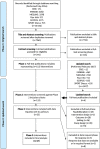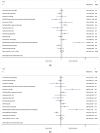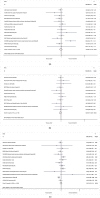Are school-based physical activity interventions effective and equitable? A meta-analysis of cluster randomized controlled trials with accelerometer-assessed activity
- PMID: 30628172
- PMCID: PMC6563481
- DOI: 10.1111/obr.12823
Are school-based physical activity interventions effective and equitable? A meta-analysis of cluster randomized controlled trials with accelerometer-assessed activity
Abstract
The prevalence of childhood obesity is increasing at epidemic rates globally, with widening inequalities between advantaged and disadvantaged groups. Despite the promise of schools as a universal context to access and influence all children, the potential of school-based interventions to positively impact children's physical activity behaviour, and obesity risk, remains uncertain. We searched six electronic databases to February 2017 for cluster randomized trials of school-based physical activity interventions. Following data extraction, authors were sent re-analysis requests. For each trial, a mean change score from baseline to follow-up was calculated for daily minutes of accelerometer-assessed moderate-to-vigorous physical activity (MVPA), for the main effect, by gender, and by socio-economic position (SEP). Twenty-five trials met the inclusion criteria; 17 trials provided relevant data for inclusion in the meta-analyses. The pooled main effect for daily minutes of MVPA was nonexistent and nonsignificant. There was no evidence of differential effectiveness by gender or SEP. This review provides the strongest evidence to date that current school-based efforts do not positively impact young people's physical activity across the full day, with no difference in effect across gender and SEP. Further assessment and maximization of implementation fidelity is required before it can be concluded that these interventions have no contribution to make.
Keywords: children and adolescents; meta-analysis; physical activity; systematic review.
© 2019 The Authors. Obesity Reviews published by John Wiley & Sons Ltd on behalf of World Obesity Federation.
Conflict of interest statement
Dr Adams reports grants from the Medical Research Council during the conduct of the study. Dr van Sluijs reports grants from the MRC, ESCR, and Wellcome Trust outside of the submitted work. R. Love was nothing to disclose.
Figures




References
-
- Abarca‐Gómez L, Abdeen ZA, Hamid ZA, et al. Worldwide trends in body‐mass index, underweight, overweight, and obesity from 1975 to 2016: a pooled analysis of 2416 population‐based measurement studies in 128·9 million children, adolescents, and adults. Lancet. 2017;0(0):1‐16. 10.1016/S0140-6736(17)32129-3 - DOI - PMC - PubMed
-
- World Health Organization . Global Status Report on Non‐Communicable Diseases. Geneva, Switzerland; 2014. http://www.who.int/nmh/publications/ncd‐status‐report‐2014/en/.
-
- World Health Organization . Global Recommendations on Physical Activity for Health; 2010. http://apps.who.int/iris/bitstream/10665/44399/1/9789241599979_eng.pdf. - PubMed
Publication types
MeSH terms
Grants and funding
- MR/K023187/1/Centre for Diet and Activity Research (CEDAR)/International
- MC_UU_12015/7/MRC_/Medical Research Council/United Kingdom
- ES/G007462/1/Centre for Diet and Activity Research (CEDAR)/International
- WT_/Wellcome Trust/United Kingdom
- 087636/Z/08/Z/Centre for Diet and Activity Research (CEDAR)/International
LinkOut - more resources
Full Text Sources
Medical
Miscellaneous

